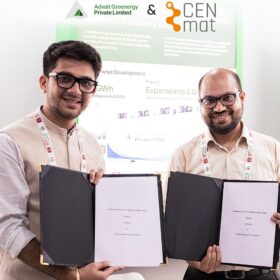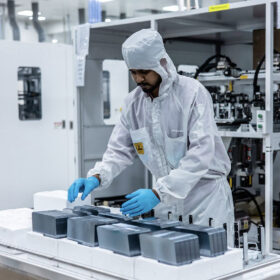The International Solar Alliance (ISA) will convene the Sixth Regional Committee Meeting (RCM) for the Europe and Others Region from 10–12 June 2025 in Brussels, Belgium. The meeting will bring together country representatives, technical universities, think tanks, institutional partners, and private sector leaders to drive a unified and strategic agenda for global solar deployment.
With the theme ‘Elevating the Region’s Role in the Global Solar Transition’, this year’s RCM is poised to deliver actionable strategies across key areas of innovation, policy, finance, and capacity building. Mr Ashish Khanna, Director General, ISA, said, “The Sixth Regional Committee Meeting of the International Solar Alliance for Europe and the Others Region will be a pivotal platform to advance collaborative action on solar energy. As part of an evolving vision, ISA is ready to launch a USD 200 mn catalytic finance facility for Africa, seeking to combine 10 existing national centres of excellence in Member Countries with a Global Capability Centre providing cutting edge AI and digital solutions to all our Member Countries, initiating technology policy and roadmaps solutions and selectively pursuing regional and country platforms for transformational change. This Meeting will reaffirm our commitment to building a cleaner, more resilient energy future through multilateral cooperation and public-private synergy.”
Anchored by the regional leadership of Germany and Italy as Vice Presidents for the Region and with strategic support from the Embassy of India, Belgium, Luxembourg, and the European Union, the RCM will foster dynamic collaboration across borders and sectors.
Acknowledging their role and contribution, Mr Khanna added, “The International Solar Alliance extends its sincere appreciation to all our esteemed partners whose support has been instrumental in shaping the Sixth Regional Committee Meeting. We are particularly grateful to the Vice Presidents from the Region, Germany and France, the Embassy of India in Belgium, and the European Union. Your strategic collaboration strengthens our collective efforts to accelerate the global solar transition.”
The Sixth RCM will address the following ISA priorities oriented to scale global solar adoption.
· The Catalytic Finance Hub will provide catalytic and blended finance for risk mitigation to promote private investment in Africa (USD 74 million of a USD 200 million fund has been mobilised), leading to subsequent facilities in Asia and the Pacific, Latin America, and the Caribbean.
· Global Capability Centre and Digitisation pursuing the vision of Silicon Valley for solar in India using a hub-and-spoke model connecting existing national centres of excellence operating as STAR-C, mainstreaming innovation through Solar X Startup Challenge, replicating the success of Solar Energy Corporation of India in Africa, and providing technical assistance.
· Regional and country-level engagement through a selective platform for aggregation and scaling, such as the SIDS platform, focusing on e-tendering and e-procurement.
· Technology Roadmap and Policy to manage the uptake of solar in the ISA Member Countries, especially on solar supply chain diversification issues and points of view on new and emerging technologies.
The thematic sessions at the RCM will align discussions with the following goals:
- Co-designing the Solar Global Capability Centre (GCC): The RCM will invite training institutions, technical universities, and think tanks to co-develop solar training modules, certification programmes, and institutional architecture to support ISA’s flagship Solar GCC. This will complement the existing partnership of EU member states with STAR Centres, which aims to build global solar capacity and innovation.
- Policy Innovation and Roadmaps: Over 80% of ISA Member Countries require comprehensive national solar strategies. Structured policy dialogues at the RCM will offer Europe and the Others Region the chance to lead the development of enabling policy ecosystems in partnership with developing countries, helping reduce investment risks and unlock global finance.
- Digital Public Infrastructure for Energy: The RCM will spotlight the digital transformation of the solar sector, including AI-driven energy management systems, digital twins, and procurement platforms. These tools are essential to reducing system costs and integrating variable renewables efficiently and equitably.
- Mobilising Private Sector Capital: With over 70% of global net-zero investments expected to come from the private sector, ISA’s CEO Caucus will serve as a high-level forum to strengthen public-private partnerships and shape co-investment strategies in emerging markets.
This Regional Committee Meeting will be a milestone event, setting a transformative agenda for the coming year and ISA’s long-term trajectory. It will culminate in a forward-looking roadmap that integrates strategic thinking with concrete action, aligned with ISA’s Framework Agreement and global climate goals.
About the ISA Regional Committee for Europe and the Others Region Meeting: The Regional Committees of the ISA meet annually, chaired by two Vice-Presidents from the Region, and aim to assess and discuss progress, challenges, and opportunities related to ISA’s programmatic support, flagship initiatives, partnerships, private sector engagements, and work plan for the Region. A significant goal of the Regional Committee Meetings is smooth coordination among the Region’s Member Countries. The Europe and the Others Region currently includes 15 Member Countries, 4 Signatory Countries, and 32 Prospective Countries, bringing the total number of countries engaged in ISA activities within the region to 51. This growing regional representation reflects a strong foundation for advancing collaborative solar initiatives and deepening multilateral engagement.
About the International Solar Alliance
The International Solar Alliance is a global initiative launched in 2015 by India and France at COP21 in Paris. It has 123 Member and Signatory Countries. The Alliance works with governments to improve energy access and security worldwide and promotes solar power as a sustainable transition to a carbon-neutral future.
ISA’s mission is to unlock US$1 trillion of investments in solar by 2030 while reducing the cost of the technology and its financing. It promotes the use of solar energy in agriculture, health, transport, and power generation sectors. ISA Member Countries are driving change by enacting policies and regulations, sharing best practices, agreeing on common standards, and mobilising investments.
Through this work, ISA has identified, designed and tested new business models for solar projects; supported governments to make their energy legislation and policies solar-friendly through Ease of Doing Solar analytics and advisory; pooled demand for solar technology from different countries; and drove down costs; improved access to finance by reducing the risks and making the sector more attractive to private investment; increased access to solar training, data and insights for solar engineers and energy policymakers.
With its advocacy for solar-powered solutions, ISA aims to transform lives, bring clean, reliable, and affordable energy to communities worldwide, fuel sustainable growth, and improve quality of life. On 6 December 2017, 15 countries signed and ratified the ISA Framework Agreement, making ISA the first international intergovernmental organisation to be headquartered in India.
ISA is partnering with multilateral development banks (MDBs), development financial institutions (DFIs), private and public sector organisations, civil society, and other international institutions to deploy cost-effective and transformational solutions through solar energy, especially in the least Developed Countries (LDCs) and the Small Island Developing States (SIDS).





